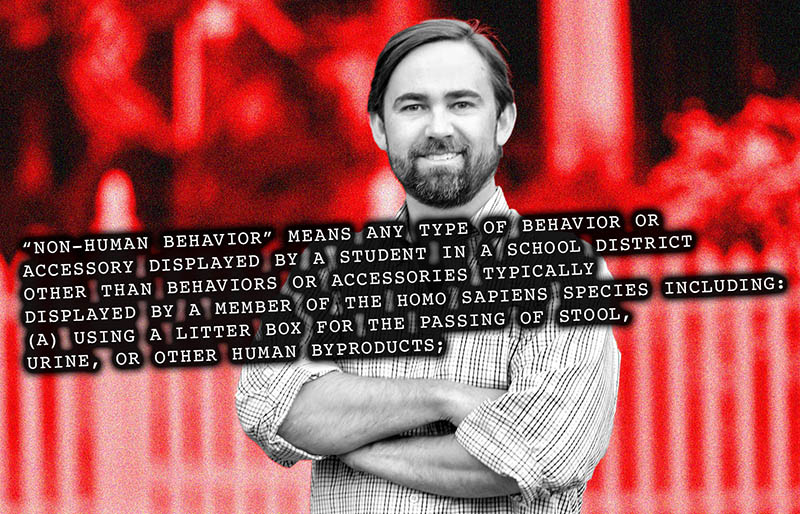Proposed regulation in Delaware would force schools to out transgender students to their parents
LGBTQ advocates call on governor to withdraw regulation, while Republicans propose constitutional amendment on "parental rights"

LGBTQ advocates are urging Delaware Gov. John Carney (D) to withdraw a revised regulation that would require schools to out transgender students to their parents if a student wishes to be treated according to their gender identity.
Regulation 225, as originally written and promoted by Carney’s administration, would have created an anti-bias policy that protects transgender students in Delaware public schools from being discriminated against based on their gender identity.
But Republicans and parents’ groups objected to the regulation, specifically a portion of it that would have allowed school administrators to treat any child according to their gender identity without notifying parents. They claimed the measure infringed upon parental rights and interfered with parents’ beliefs on how best to raise their children.
Spooked by the backlash, the Carney administration amended the regulation to stress parental rights. But now the regulation essentially requires schools to out transgender children to their parents if the student wishes to be called according to their chosen name, be recognized according to their gender identity, or use facilities or play on sports teams that match their gender identity.
“A school shall request permission from the parent or legal guardian before accommodating a request by a minor student that the school take action to recognize a change in any Protected Characteristic,” the revised version of the regulation reads. “Prior to requesting such permission, to safeguard the health, safety and well-being of the student, the school shall discuss with the student the permission process and, based on its discussions with the student, assess the degree to which the parent or legal guardian is aware of the change to the Protected Characteristic.
“If the student does not permit the school to request permission from the parent or legal guardian, then the request to take action shall not be accepted.”
LGBTQ advocates note that the regulation is so overly broad that it could silence teachers’ free speech rights by punishing them if they refer to a child by their preferred name or pronouns, even in a casual manner or when acting in a non-official capacity.
Even for those cases in which students do consent to parental notification, the regulation is problematic. For example, an LGBTQ-identifying child who wants to play sports is allowed to participate and try out for a team based on their gender identity. But the regulation cedes power to the Delaware Interscholastic Athletic Association, whose policy allows any parent to register an objection to the presence of a transgender student on the team, thereby forcing transgender youth to go through hearings and a lengthy appeals process.
Due to the harmful impacts that the regulation could have on children’s lives, advocates are now calling on the governor to scrap the regulation altogether and start from scratch at a future time.
“If adopted, Regulation 225 would license discrimination against transgender students, violate federal civil rights laws and undermine the health, safety and dignity of kids who deserve our support,” Sarah Warbelow, the legal director for the Human Rights Campaign, said in a statement. “Requiring the forced outing of transgender students as a precondition to protect their rights is discriminatory and cruel. We implore Governor Carney and his administration to immediately withdraw this draft regulation to ensure that Delaware stands on the right side of both the law and history.”
Advocates point out that the proposed regulation also fails to adhere to best practices for dealing with transgender students.
“Across Delaware, far too many transgender students wake up in the morning fearful of bullying and discrimination during the school day ahead,” Sarah McBride, HRC’s National Press Secretary, who is a transgender Delaware native and board member of Equality Delaware, said in a statement. “The current draft of the regulation fails Delaware’s moral and legal obligation to ensure a safe and quality education for all students, including transgender students.”
Opponents of the revised regulation note it may also be illegal to enforce. Recently, the 3rd U.S. Circuit Court of Appeals, which covers Delaware, affirmed, in a case involving a Pennsylvania school district’s pro-transgender policy, that federal civil rights laws protect transgender students. That decision is considered legally binding in all states within the court’s jurisdiction.
In addition to lobbying the governor, LGBTQ activists are urging members of their community, and allies, to submit comments opposing Regulation 225. To register their disapproval, they can email DOEregulations.comment@doe.k12.de.us.
Delaware Republicans also want Carney to withdraw the revised version, as some members of their base aren’t content with schools recognizing transgender identity at all, even if the parents consent. As a result, 21 of the 26 Republicans in the General Assembly are backing a proposed constitutional amendment that would codify parental rights, including the right to notification, in the Delaware Constitution. The amendment would hamstring government from interfering with a parent’s decision on how to raise their child, unless the child is at risk of abuse or physical harm.
“When Regulation 225 was initially released, it pointed out the need for parental rights to be protected,’ Rep. Charles Postles (R-Milford), the lead sponsor of the amendment, told NPR affiliate WHYY. “It pointed out how government could suggest regulations — more than suggest — make it really the effect of law or regulation without the consideration of parental rights.”
But Mark Purpura, a lawyer, LGBTQ advocate, and board member of Equality Delaware, told WHYY that he believed the amendment was offered as a form of retaliation against a bill banning conversion therapy that recently passed the legislature.
“They are basically doubling down on conversion therapy with this constitutional amendment,” Purpura said. “We view this as a political ploy on the backs of LGTB and at-risk youth. This is a very broadly written constitutional amendment that frankly would facility abuse of children in Delaware and have very bad outcomes for children in Delaware.”
Support Metro Weekly’s Journalism
These are challenging times for news organizations. And yet it’s crucial we stay active and provide vital resources and information to both our local readers and the world. So won’t you please take a moment and consider supporting Metro Weekly with a membership? For as little as $5 a month, you can help ensure Metro Weekly magazine and MetroWeekly.com remain free, viable resources as we provide the best, most diverse, culturally-resonant LGBTQ coverage in both the D.C. region and around the world. Memberships come with exclusive perks and discounts, your own personal digital delivery of each week’s magazine (and an archive), access to our Member's Lounge when it launches this fall, and exclusive members-only items like Metro Weekly Membership Mugs and Tote Bags! Check out all our membership levels here and please join us today!




























You must be logged in to post a comment.